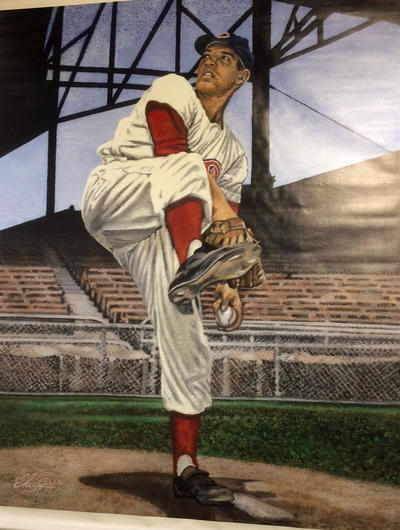
Most Americans were consumed with World War II in June 1944. It started with D-Day and the daily reports of Allied forces marching into France. It was personal for most families, because every street had one or two young men fighting in Europe or the Pacific.
The baseball season went on, as President Roosevelt desired. However, the teams had to get very creative to fill their rosters. They could not rely on Latin players as they do today, and African Americans could not play anyway. I should add that a lot of Cuban young men served in World War II in support of U.S. forces.
On June 10, 1944, the Cincinnati Reds gave the ball to Joe Nuxall, and history was made:
In 1942, after the Japanese attack on Pearl Harbor, President Roosevelt wrote to Baseball Commissioner Kenesaw Mountain Landis to ask that baseball continue even though the United States was going to war:Nuxall went into the radio booth after baseball and worked on Reds games for a long time. In fact, I remember catching Reds games on WLW out of Cincinnati. They came in clearly at night. It also made for good company the few times that I drove on the Ohio Turnpike going back to Wisconsin.
“I honestly feel that it would be best for the country to keep baseball going. There will be fewer people unemployed and everybody will work longer hours and harder than ever before. And that means they ought to have a chance for recreation and for taking their minds off their work even more than before.”
Landis obliged, and play continued even as the stars of the era left to enroll in the armed forces. Detroit Tigers first baseman Hank Greenberg was among the players who had enlisted even before 1941, in the prime of his Hall of Fame career.
After the 1942 season, more than 500 big league players enlisted, including stars Ted Williams, Joe DiMaggio, Bob Feller, Dom DiMaggio and Pee Wee Reese.
Meanwhile, the major leagues had to make do with whoever was available, and the 15-year-old Nuxhall was just one of many new players who normally wouldn’t have come close to a shot at the big leagues.
Others included Pete Gray, a one-armed outfielder who hit .218 and drove in 13 runs in 77 games with the St. Louis Browns in 1945, and 16-year-old Carl Scheib, who pitched for the Philadelphia A’s in 1943.
Eighteen-year-old Vern Benson got to hit twice for the A’s that year, while 17-year-old Cass Michaels began his 12-year major league career many years ahead of schedule playing third base for the White Sox.
Older players also got in on the act: Mike Ryba and Al Simmons were among the former major leaguers who returned to fill in for their younger counterparts overseas.
As for Nuxhall, though the June 10 outing was his only appearance in 1944, he rejoined the Reds in 1952 when he was 23 years old and pitched 15 seasons in the big leagues. He ended his career with a 135-117 record and a 3.90 ERA.
Nuxall died in 2007.
Let's remember the many who served and came home to make the game greater than ever.
P.S. You can listen to my show. If you like our posts, please look for ”Donate” on the right column of the blog page.